44+ Sample Minor Child Power of Attorney Form Templates
-
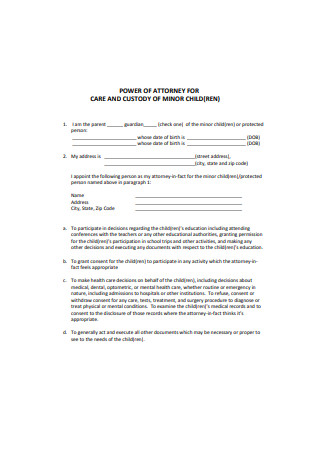
Power of Attorney for Care and Custody of Minor Child
-
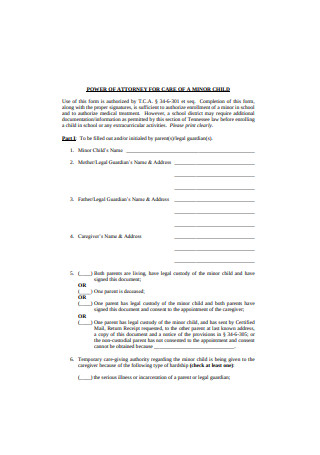
Power of Attorney for Care of a Minor Child
-
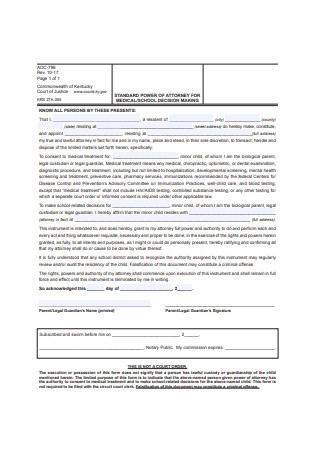
Standard Power of Attorney for Minor Child
-
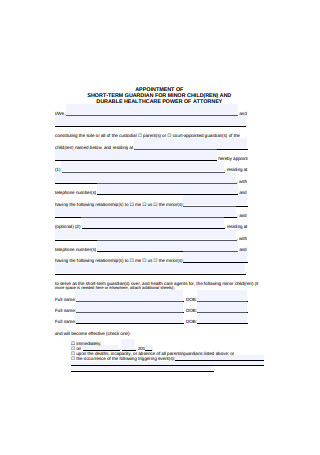
Power of Attorney Appointment for Minor Child
-

Parental Power of Attorney for Minor Child
-
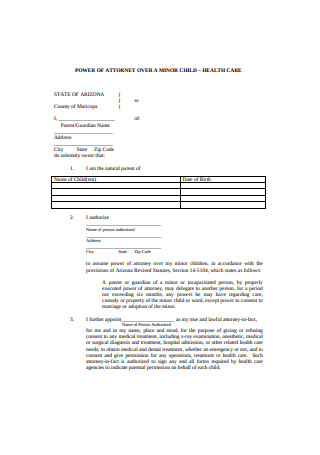
Power of Attorney Over a Minor Child Health Care
-
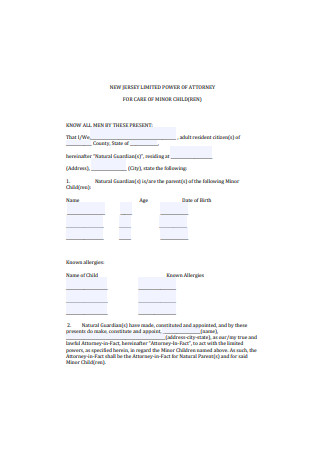
Sample Power of Attorney for Care of Minor Child
-
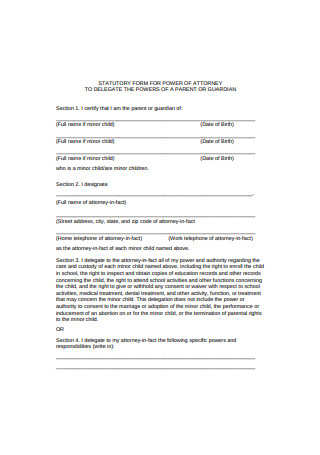
Statutory Power of Attorney for Minor Child
-
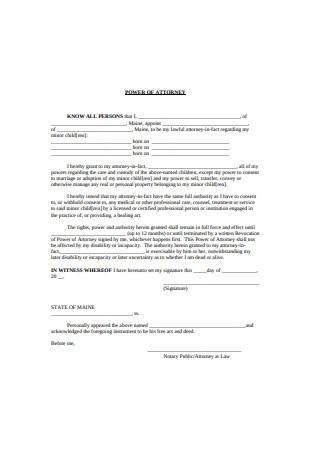
Power of Attorney Form for Minor Child
-
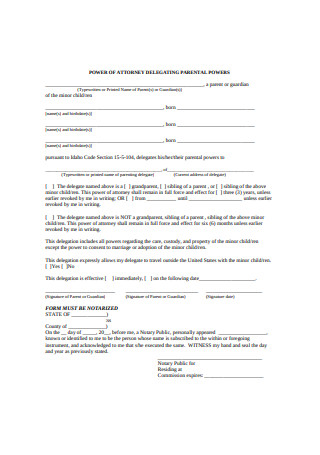
Minor Child Power of Attorney Delegated for Parental Power
-
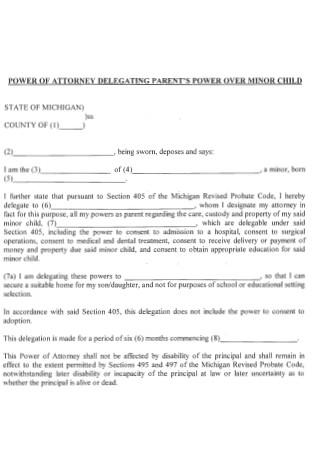
Power of Attorney Delegated Parents Over Minor Child
-
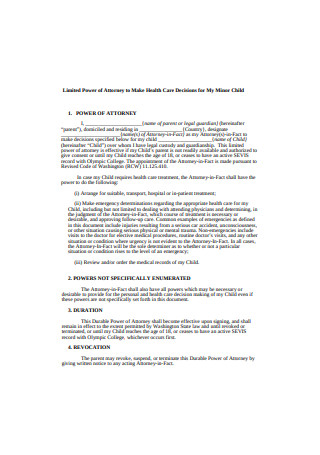
Limited Power of Attorney to Make Health Care Decisions for Minor Child
-
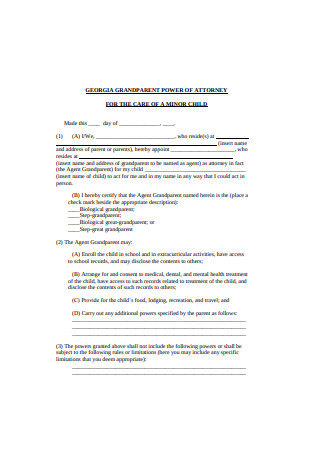
Grand ParentPower of Attorney for Care of a Minor Child
-
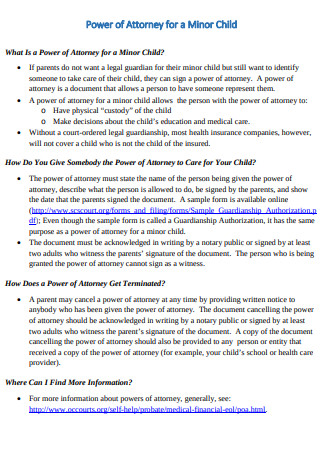
Power of Attorney for a Minor Child Example
-
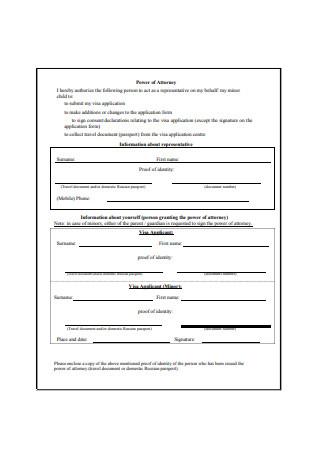
Form for Minor Child Power of Attorney
-
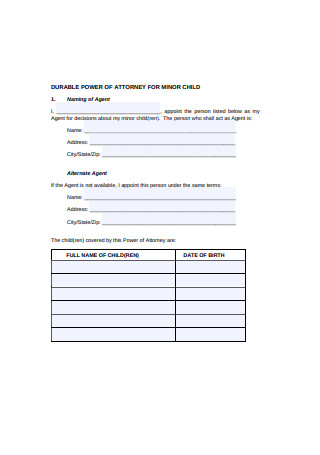
Durable Power of Attorney for Minor Child
-
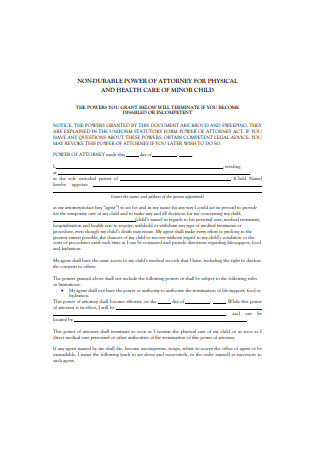
Non-Durable Power of Attorney for Physical and Healthcare of Minor Child
-
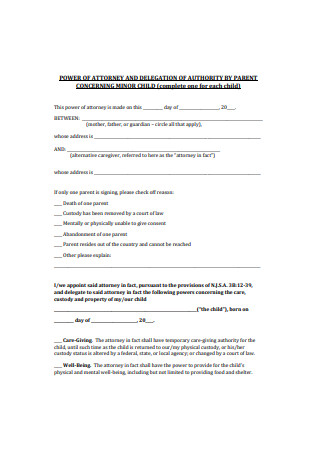
Power of Attorney and Delegation of Authority by Parent Concerning Minor Child
-
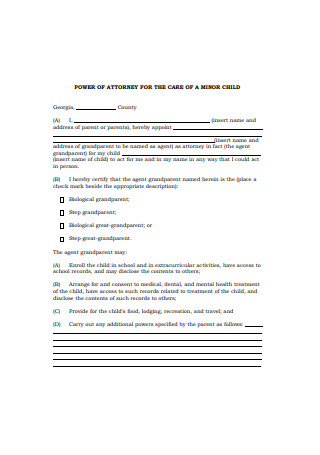
Power of Attorney for the Care of a Minor Child
-
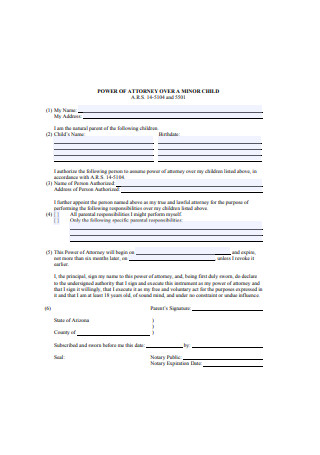
Power of Attorney Over a Minor Child
-
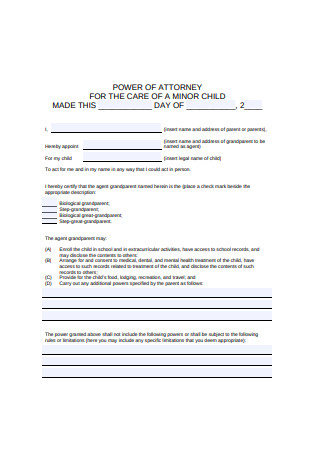
Formal Power of Attorney for the Care of a Minor Child
-
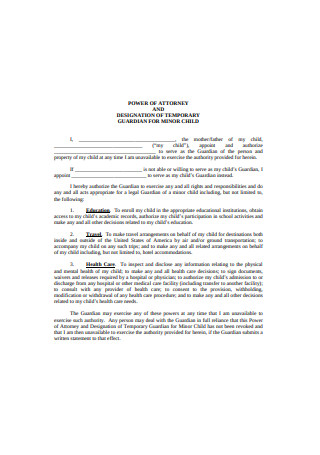
Power of Attorney and Designation of Temporary Guardian for Minor Child
-
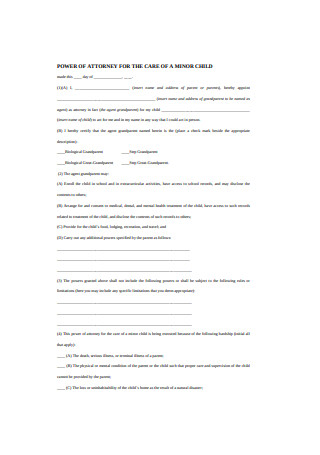
Sample Power of Attorney for the Care of a Minor Child
-
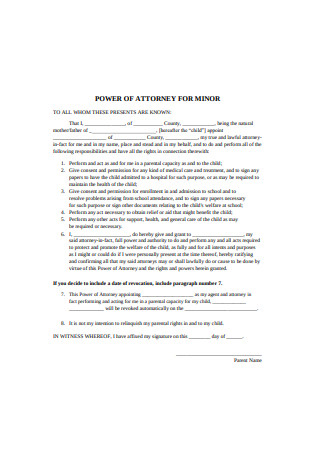
Power of Attorney for Minor Child
-
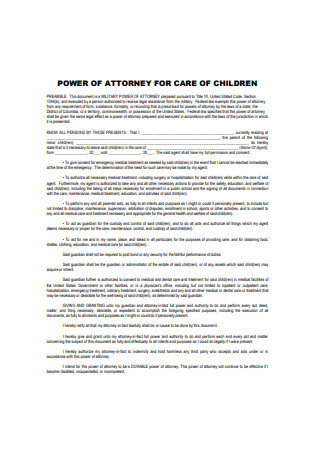
Power of Attorney for Care of Minor Children
-
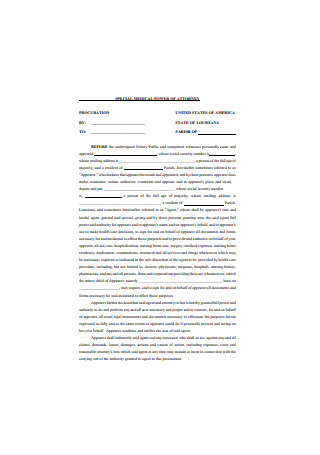
Special Medical Power of Attorney for Minor Child
-
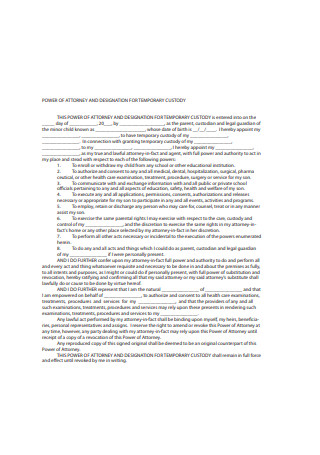
Power of Attorney and Designation for Temporary Custody of Minor Child
-
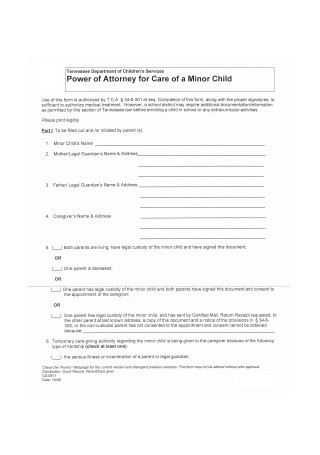
Power of Attorney for Care of a Minor Child Example
-
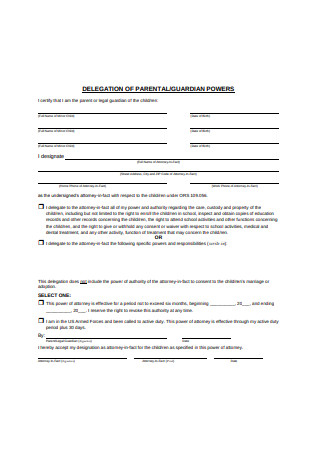
Delegation of Parental Power of Attorney for Minor Child
-
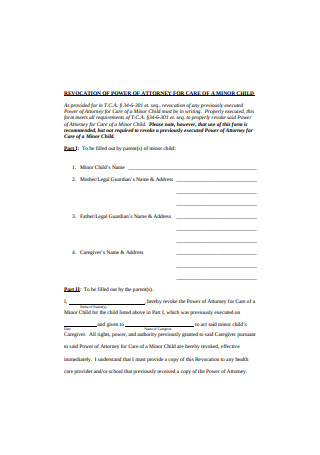
Revocation of Power of Attorney for Care of a Minor Child
-

Form of Power of Attorney for Minor Child
-
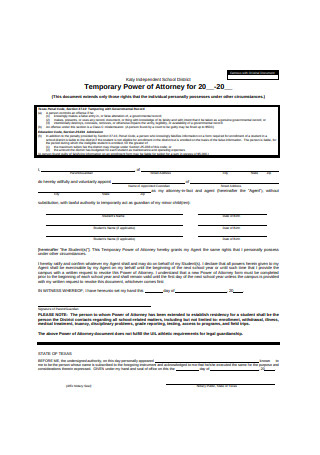
Temporary Power of Attorney for Minor Child
-
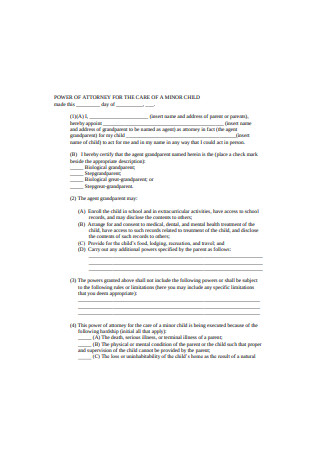
Power of Attorney for the Care of Minor Child Form
-
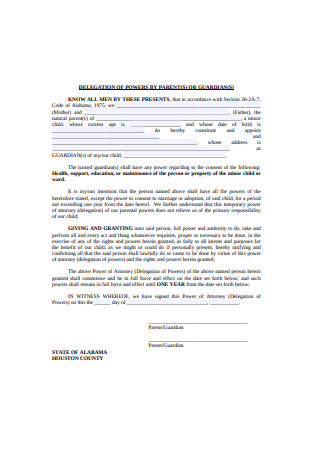
Minor Child Power of Authority Delegation of Power by Parents
-
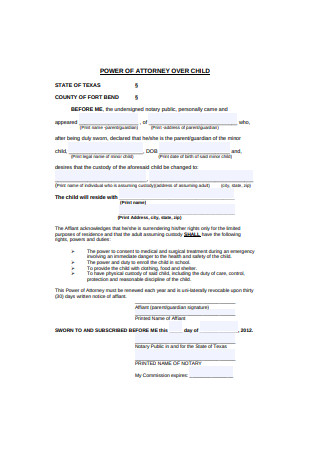
Power of Attorney Over a Minor Child Example
-
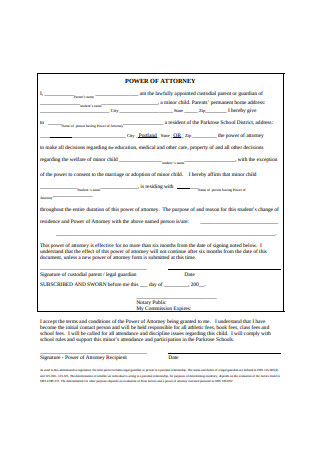
Minor Child Power of Attorney
-
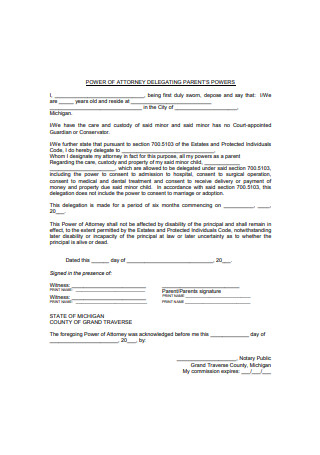
Minor Child Power of Attorney Delegating Parents Powers
-
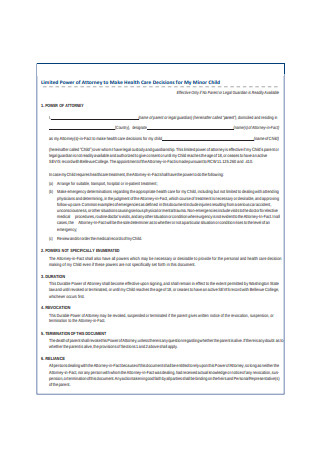
Power of Attorney to Make Health Care Decisions for Minor Child
-
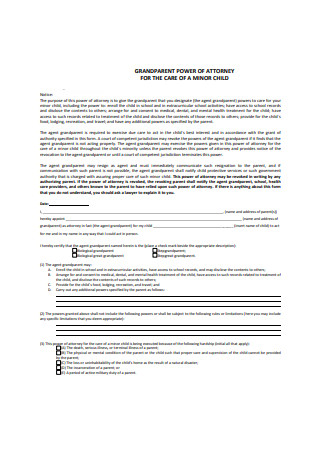
Grand Parent Power of Attorney for the Care of a Minor Child Example
-
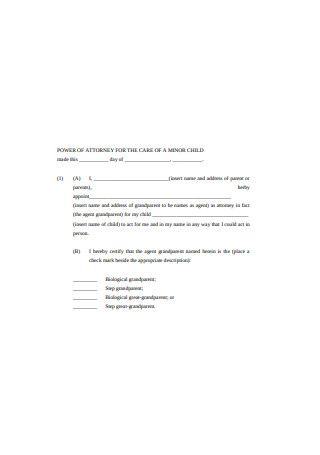
Power of Attorney Form for Minor Child Format
-
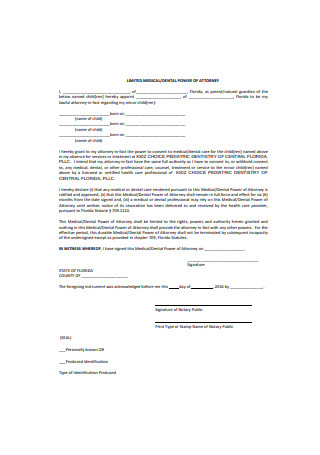
Dental Power of Attorney for Minor Child
-
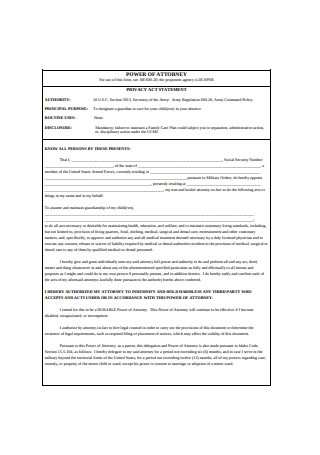
Guardianship Power of Attorney for Minor Child
-
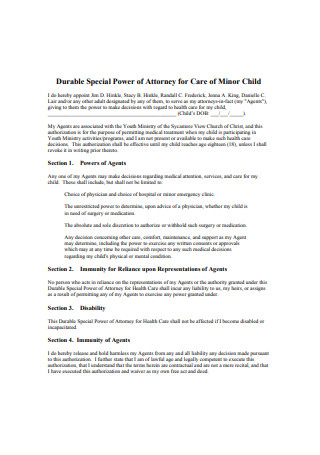
Durable Special Power of Attorney for Care of Minor Child
-
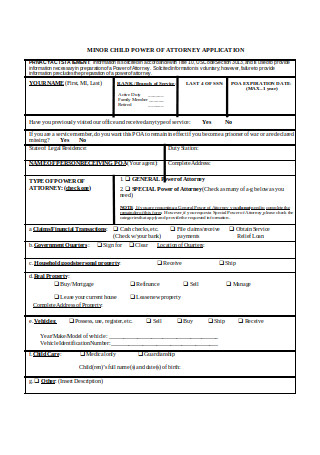
Minor Child Power of Attorney Application Form
-
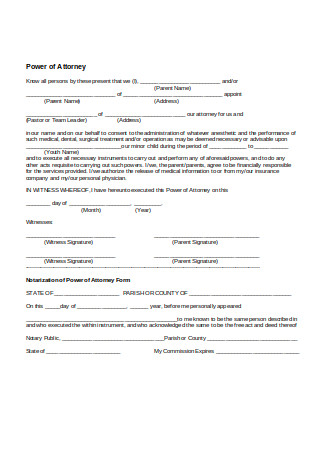
Formal Power of Attorney for Minor Child
What Is a Minor Child Power of Attorney?
A minor child power of attorney allows parents to leave their children in the hands of a caretaker for a temporary period. It can be a grandparent, a relative, a neighbor, a teacher, a nanny, or anyone who has the potential of caring for the child for the time being. Giving someone full control over the decisions made for their child is never easy, but it is a crucial step to take if you wish to safeguard your child from unfortunate events. Parents are not obliged to provide a reason for granting this power to another individual as long as the POA is for short-term use. Parents that are going away for a business trip, vacation, military service, jail time, or surgery often benefit from this type of POA the most. And if the parent or legal guardian is incapable of making a sound decision for the child due to an injury or illness, someone who has a close relationship with the family is usually named.
As for a long-term guardianship of a minor, a last will and testament are highly advisable.
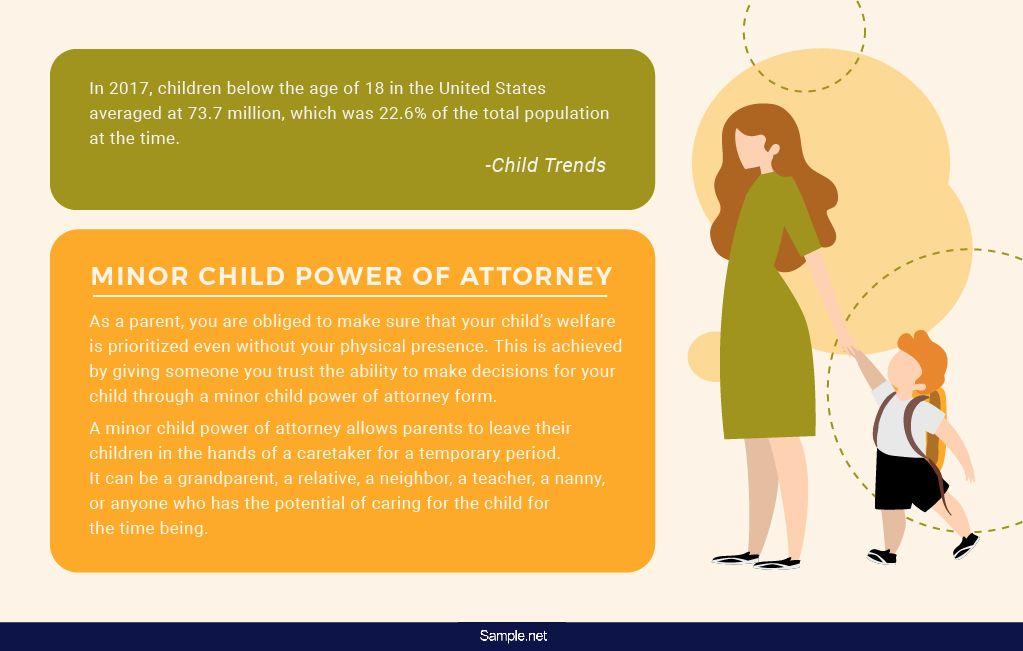
The Importance of a Minor Child Power of Attorney
People work hard to pay the bills and provide for their family, making it nearly impossible to juggle their work and family obligations together. Because of this, families with working parents choose to enroll their children in a learning center or hire a nanny to watch over their kids while they’re away. The Center for American Progress claims that almost one-quarter (23.4 percent) of children under the age of five are in some form of childcare arrangement. It’s a standard setup for modern-day families that try to make ends meet by allowing both parents to work regular jobs.
However, it’s only natural to feel uneasy about leaving your child with someone who isn’t a blood relative. Most people find it difficult to put their child under the care of someone else, but it’s often necessary as a parent when you aren’t there to attend to the child’s needs. As temporary guardians to the child, caretakers must be granted the authority to make decisions on the parents’ behalf. The scope of the guardian’s responsibilities will depend on what the parent would allow. In most cases, a limited power of attorney is issued to control the rights of the child’s primary caregiver. This is especially important when it comes to consenting to medical treatments and making medical-related decisions found in a medical (health care) power of attorney when the parent or legal guardian of the child is unavailable to do so.
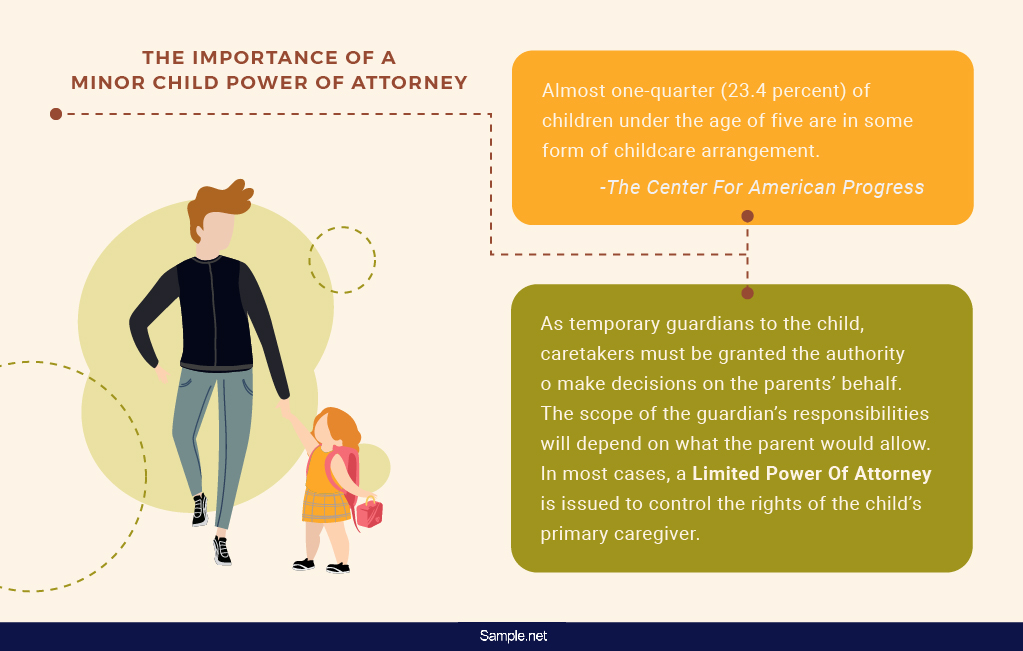
How to Prepare a Minor Child Power of Attorney
You and your spouse are leaving on a business trip in a few weeks and need someone to take care of your children while you’re away. Since all your relatives live in another state, you decide to let the woman next door watch over your teenage children to make sure they are safe and secured for the next couple of days. But because your neighbor is not the legal guardian of your children, she does not have the authority to make decisions on their behalf in the event of an emergency. Fortunately, a POA for a minor allows parents to provide another adult with temporary custodial rights without giving up their parental rights or taking matters to court. To write the POA, follow the steps below.
Step 1: Write the Necessary Information
Look for a template that you can download and customize for your personal use. Creating a POA is much easier that way as it spares you from the hassle of starting from scratch. After finding a template that suits your standards, begin with the essentials. This includes the name of the child and the parent(s) involved in the POA. The correct legal names of those concerned must be specified in the document to avoid problems. Any spelling errors may void the POA and prevent the temporary guardian from executing his or her role in the arrangement.
Step 2: Appoint an Attorney-in-Fact
The attorney-in-fact, commonly known as the agent of the POA, is responsible for carrying out the tasks granted by the parents of the child. It is usually someone who is closely related to the family, like a relative, or someone who lives close to the household. Some parents choose their neighbors as agents of the POA when their own relatives live nowhere near the family’s home. It’s also a sensible option when raising teenagers that don’t want to leave home while their parents are away. Neighbors or friends of the family can visit the child regularly until their help is no longer needed.
Step 3: Specify the Agent’s Powers
As a parent, you can decide whether to limit the authority delegated to the agent or not. If you choose to grant all powers to the selected agent, you don’t need to go into detail as to what the temporary guardian is permitted to perform. This usually happens when the agent is a close relative who can make decisions that respect the best interests of the child and his or her parents. But if you choose to give specific authority, it’s best to provide a description of the power(s) granted to the agent. You must be as accurate as possible to make sure the assigned individual strictly follows your wishes.
Step 4: Determine the Longevity of Powers
Enter the date in which the minor child power of attorney will commence. The means and time of termination should then follow. For instance, if you’re allowing the child to travel without you, a power of attorney may authorize the child’s adult companion to be his or her guardian during the entire duration of the trip. If you are unable to specify a specific end date, you can provide other information that indicates its termination. Although military service parents deployed to a location away from their children may not have a definite date of their return, the document may allow them to terminate the POA as soon as they come back. This must be specified clearly in the document to ensure that the POA remains valid only for a particular period. Keep in mind that the guardianship laws in most states only cover a maximum period of one year.
Step 5: Enter the State that Will Govern the POA
The laws that govern the power of attorney will most often depend on the state in which the minor resides. Bear in mind that policies that concern a POA vary from one state to another. If you have your doubts about the legality of your POA, you can seek the assistance of an experienced attorney. Getting a lawyer to help you write the POA ensures that the document stays within the constraints of your state laws.
Step 6: Confirm Each Party’s Acceptance
Inform the chosen individual before naming them in your POA. The agent can express their acceptance as the POA’s attorney-in-fact by signing the document with their print name, signature, and date of confirmation. Make sure that the agent reads the terms covered by the POA and is given a chance to raise his or her concerns prior to signing. Even if your state does not require it, it’s a good idea to have at least two witnesses sign the document to prove its legitimacy. These individuals may attest to the POA’s authenticity if a dispute arises.
Step 7: Have it Notarized
For the final phase of the process, have the minor child power of attorney signed by a notary public. You can have it done for free at your local bank or any government office that provides the said service. A notary acknowledgment is essential to verify the signee’s willingness to participate in the agreement under his or her proper understanding of its content.
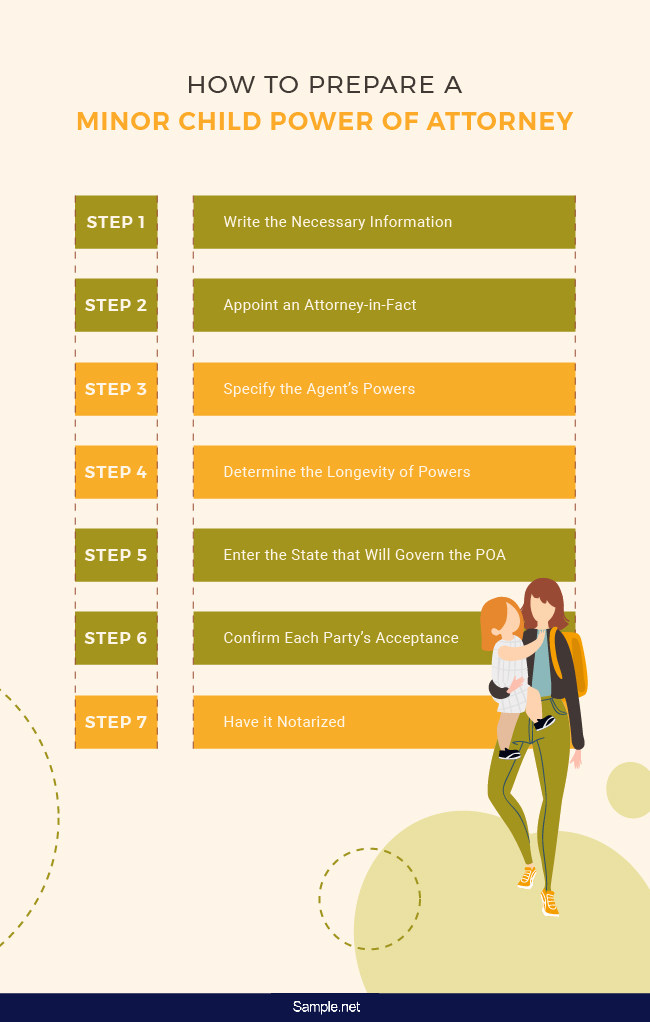
The Dos and Don’ts of a Minor Child Power of Attorney
As a formal legal document, the minor child power of attorney must satisfy the laws of the state in terms of how it is written and signed. Those without proper experience may find it challenging to create a comprehensive plan that functions the way it is intended to. To learn more about the best approach to drafting a POA, refer to the guidelines below.
Dos
1. Do choose someone competent.
Deciding who gets the temporary rights to become your child’s guardian is not the easiest thing to do. There are several factors to consider before naming the individual in your POA. It must be someone you trust, someone your child is comfortable with, and someone that can act on behalf of your child’s best interests. Most parents delegate their sibling or family relative with the responsibility given how it’s the most logical option anyone could think of when faced with the dilemma.
2. Do make the obligations of the agent perfectly clear.
Identify the extent of the authority granted to your child’s temporary guardian. It’s important to be very specific with what you are allowing someone else to do on behalf of your rights as a parent. It’s always good to define these responsibilities clearly in the POA to avoid confusion or misinterpretation. Allow the agent to ask questions over what you include in the POA to keep everyone on the same page.
3. Do plan for the worst.
As much as the thought of it scares us, we can never predict what happens to the people we love when we aren’t by their side. Taking the time to consider the unknown offers you the chance to make rational decisions for your child’s safety and well-being. If you’re going to a place that’s miles away from home, giving your child’s caretaker the authority to make critical decisions during a medical emergency may require some careful thought. Keep in mind that the odds are against you at a circumstance like this. Unfortunate cases where the caretaker is prohibited from making the decision without the parent’s consent will likely force doctors to delay the treatment until they could get a hold of the child’s parents. Thus, you must think critically when planning what the POA covers.
4. Do collect documents to support the POA.
One way to help the attorney-in-fact prove the validity of the POA is to secure identification documents that support its contents. This includes government-issued ID cards or anything similar. It’s also best to gather medical records and other personal files that may be useful to the agent in making crucial decisions for the child. If the child has any allergies, medications, or therapy sessions that one should know about, these supporting documents may help the agent carry out his or her duties more effectively.
5. Do prepare a back-up plan.
Unforeseen circumstances can put a damper on things and ruin your plans at the least convenient times. Even if your selected agent initially agrees to the task of caring for the child, there’s no saying that a sudden twist in events won’t change their mind. Note that everyone has their own lives to live and personal matters to prioritize before yours. Thus, it’s best to appoint a successor agent just in case. This person can take on the responsibilities noted in the POA if the first agent is unable to perform them.
Don’ts
1. Don’t make vague statements.
A reputable POA should discuss your desires and concerns to clearly explain the extent of power you wish to grant the agent. Most POAs, including the general power of attorney, comes with a few restrictions that limit the authority given to the attorney-in-fact. These limitations are worth emphasizing to ensure that the agent is fully aware of what he or she is responsible for. Be sure to convey these points in clear statements that the reader can quickly grasp to avoid even the slightest chance of miscommunication.
2. Don’t allow the agent to change or transfer the POA to someone else.
A person has every right to decline their appointment if they wish to do so. But if you allow the agent to change or transfer the POA to some other person while it is in effect, you could be putting your child’s safety and welfare on the line. It’s never a good idea to give the agent the authority to appoint someone else to act on their behalf without your approval. And even if you are aware of this setup, the law will not recognize an individual as the child’s temporary guardian unless his or her name is in the POA. Instead, the successor agent must be named in the POA in case the current agent is unwilling or incapable of meeting your terms.
3. Don’t feel pressured to sign it.
Never settle for POA documents that fail to meet your expectations. It isn’t wrong to want the best for your child, so if the POA does not satisfy your wishes, don’t sign it. It’s always best to spend your time and energy revising the legal document than to settle for something that doesn’t deliver.
4. Don’t forget to update when necessary.
If you decide to revise a few clauses from your first draft, be sure to apply these changes immediately. Conducting regular updates is a great way to keep the POA relevant to your current situation. It’s only natural to realize your mistakes after a while, so the least you could do is make up for it while you still can.
5. Don’t delay the drafting process.
Regardless of how busy you are, avoid leaving things to the last minute. There’s a list of items that are essential to the POA that you may end up forgetting when in a rush. You never know when the POA for your child might come in handy, especially during times of emergency. People that find themselves in a sticky situation tend to act out on impulse, which often leads to poor planning and bad decisions. Thus, it’s best to get started with your POA while your mind is clear enough to think rationally.
After completing the POA, the agent will obtain temporary guardianship rights to the child and will be required to present the minor child power of attorney form to execute each duty identified in the document. Setting up a POA is just as confusing as any other legal undertaking. But if you know what’s best for the child, deciding the scope and limitations of the POA will be as easy as pie.
